“Prophet Motive”
Written by Ira Steven Behr & Robert Hewitt Wolfe
Directed by Rene Auberjonois
Season 3, Episode 16
Production episode 40512-462
Original air date: February 20, 1995
Stardate: unknown
Station log: Quark’s deal with a woman named Emi—who is giving Quark oo-mox while they finalize a deal for self-sealing stembolts—is interrupted by the arrival of Grand Nagus Zek and Maihar’du, who have decided to move into Quark’s quarters, which means that Quark has to live with Rom.
Bashir has been nominated for the Carrington Award, the most prestigious medical award in the Federation. Everyone is thrilled—except for Bashir, who isn’t making a big fuss about it, mainly because the Carrington is supposed to be a lifetime achievement award, and he thinks he’s too young. Dax is impressed with his maturity.
Quark and Rom are having difficulty living together to say the least. Quark is fed up with Rom’s sloppiness and the many items from his store room in Rom’s quarters, and Rom is fed up with Quark’s constant mumbling. They go to Quark’s quarters to confront the grand nagus—
—only to find Zek in a happy, friendly, voluble mood. He’s gotten rid of all Quark’s furniture, as it distracted him from his work: revising the Rules of Acquisition. Quark and Rom are excited right up until the part where they read the revised edition, which turn out to be a repudiation of the previous Rules, from the first (“If they want their money back, give it to them,” a reversal of “Once you have their money, you never give it back”) to the last (“A good deed is its own reward,” replacing “No good deed ever goes unpunished”). Quark and Rom pour over the new Rules, hoping against hope that it’s a trick or a code or a test or something. Quark says they should play along with what they figure has to be a scheme by Zek, and act as if they know nothing. (“I can do that!” Rom says enthusiastically.)
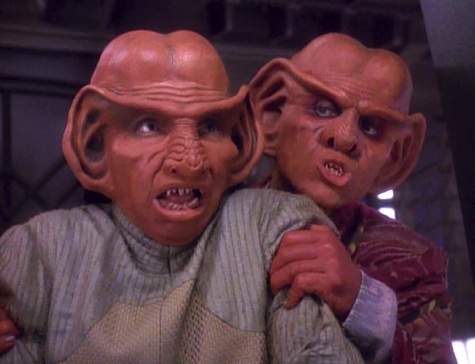
Zek arrives at the bar and buys drinks for everyone. He says he’s given up Hupyrian beetle snuff (it’s fun for him, but not so much fun for the beetle), and he also turned Emi onto a new source for stembolts at wholesale. Quark is devastated to say the least (he’s now stuck with a butt-load of stembolts and probably won’t be getting any oo-mox), while Zek insists that he’ll eventually sell the stembolts at a fair price.
O’Brien and Bashir play darts in the cargo bay. O’Brien says many of the same things to Bashir that Bashir said to Dax about how he has little to no chance of winning the Carrington. Coming from someone else, it grates more on Bashir….
Zek has formed the Ferengi Benevolent Association and made Rom and Quark both senior administrators. At this point, Quark is convinced that something is horribly wrong with Zek, but Bashir gives the grand nagus a clean bill of health. So Rom and Quark try to break into Zek’s shuttle before they’re caught by Maihar’du—only to be caught by Maihar’du. Luckily, Maihar’du is just as disturbed by Zek’s behavior and he opens the hatch for them to reveal a gift that Zek plans to give (not sell to) the Bajoran people: the Orb of Wisdom, one of the Orbs of the Prophets that had gone missing.
Quark accidentally opens it and has an Orb experience. He’s in the bar with Zek, and it’s revealed to him that he got the new Rules from the wormhole aliens. According to Zek’s personal logs, he obtained the Orb from a contact on Cardassia III, then went to the wormhole, made it about halfway, then reversed course and came to Deep Space 9. Quark needs to fix this….
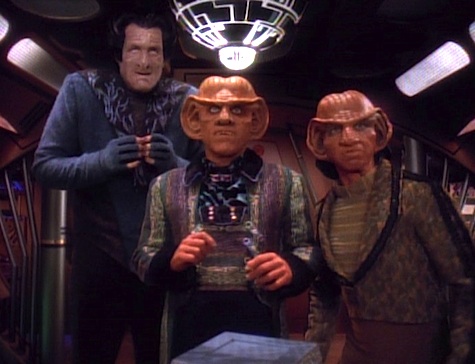
Odo comes to Bashir with a bit of gossip he got from a friend in Starfleet Intelligence that the person everyone thinks is most likely to win the Carrington isn’t going to win it—which means it could go to anybody, even Bashir. Bashir insists it doesn’t change anything and he doesn’t care all that much—which leads Odo to ask why he’s working on his acceptance speech. The chagrined Bashir doesn’t have a good answer for that.
Quark’s plan is to kidnap Zek, which he does with help from Rom and Maihar’du (well, mostly Maihar’du, who grabs Zek and puts him in a sack). Quark then flies Zek’s shuttle, with Zek in the copilot seat (still in a sack) to the wormhole. He opens the box with the Orb of Wisdom, and then he meets the wormhole aliens. They ask if “The Sisko” sent him—Sisko taught them about linear time and corporeal life—but Quark wants to know about “The Zek.” They found Zek adversarial and intrusive with his requests to learn the future “before the game is played” (yes, they remember Sisko’s baseball analogy from “Emissary”). They de-evolved Zek to a type of Ferengi that existed before they were as avaricious as they are now. They find Quark annoying and wish to do the same to him—but Quark convinces them not to. If they de-evolve him, too, more Ferengi will come to the wormhole to find out what happens—but if they restore Zek and leave Quark alone, they’ll never deal with the Ferengi again.
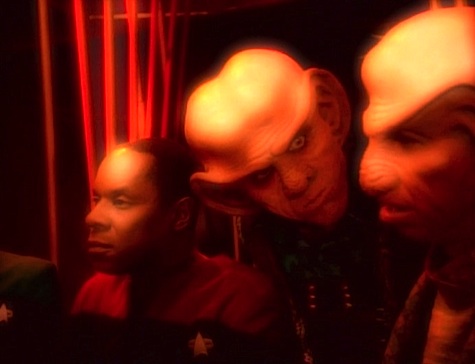
That’s good enough for them. They send Quark back, Zek is now ready to sell the Orb to the Bajorans, and Quark couldn’t be more relieved. Zek orders all copies of the revised Rules destroyed and all evidence of the FBA eradicated. Quark is happy to have Zek back, he’s just disappointed that he didn’t earn any profit. (It’s never made clear whether or not he got any of his furniture back…) However, Rom was the chief administrator of the FBA—a prime position from which to embezzle funds.
Speaking of being disappointed, Bashir doesn’t win the Carrington, as expected. But it still stings….
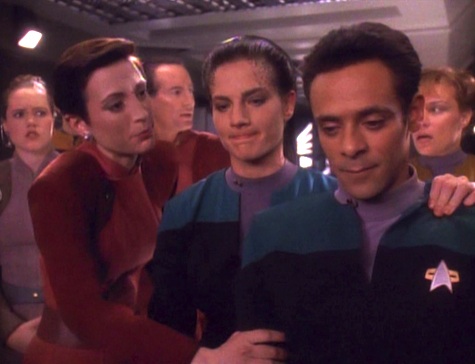
The Sisko is of Bajor: This is the first time the wormhole aliens refer to “The Sisko,” and they credit him with teaching them how to deal with corporeal linear beings. Not that they do all that stellar a job with it this time ’round….
The slug in your belly: Dax is the one who put Bashir’s name into the Carrington Award pool.
Preservation of mass and energy is for wimps: For the first time ever, we see Odo indulge in gossip-mongering, which is actually kind of hilarious.
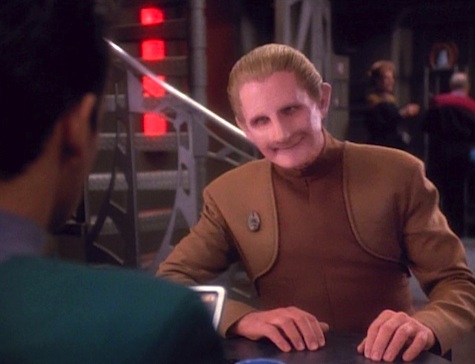
Rules of Acquisition: Among Zek’s revised Rules of Acquisition, created after the wormhole aliens de-evolved him, besides the two mentioned above: “Greed is dead” (#10, a reversal of “Greed is eternal”), “Never place profit before friendship” (#21, a reversal of “Never place friendship above profit”), “Latinum tarnishes, but family is forever” (#22, replacing “A wise man can hear profit in the wind”), and “Money can never replace dignity” (#23, replacing “Nothing is more important than your health, except for your money,” which will be established in Enterprise’s “Acquisition”).
No sex, please, we’re Starfleet: Quark finds someone who will not only pay absurd prices for his self-sealing stembolts, but she’s willing to give him all the oo-mox he wants. It’s the perfect deal until Zek shows up to, er, blow it.
Keep your ears open: “It must be some kind of code. Read me the first word of every Rule.”
“If. Never. Keep. Profit. A. Good. Smile. Honesty.”
“Aha! If never keep profit a good smile honesty.”
“What does it mean?”
“It means—absolutely nothing.”
Quark and Rom’s desperate attempt to find a secret meaning in Zek’s revised Rules.
Welcome aboard: Wallace Shawn and Tiny Ron are back as Zek and Maihar’du, as is Max Grodénchik as Rom. Juliana Donald plays Emi.
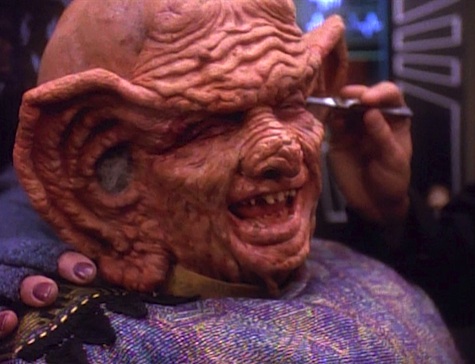
Trivial matters: This is Rene Auberjonois’s first time in the Trek director’s chair (he did previously direct two episodes of the short-lived Marblehead Manor). He will direct seven more, including two other Ferengi episodes, “Family Business” and “Ferengi Love Songs.”
Auberjonois and director of photography Jonathan West used the same technique to show communication with the wormhole aliens that director David Carson and DP Marvin Rush used in “Emissary,” which would continue to be the style used for such scenes moving forward.
This episode was inspired by a story by William N. Stape, who received no credit. Stape similarly inspired the story for TNG’s “Homeward,” for which he did receive a closing credit; it’s unknown why he didn’t receive a like credit here.
One of the empties in Rom’s quarters is Aldebaran whiskey, first seen being drunk by Scotty and Picard in TNG’s “Relics.”
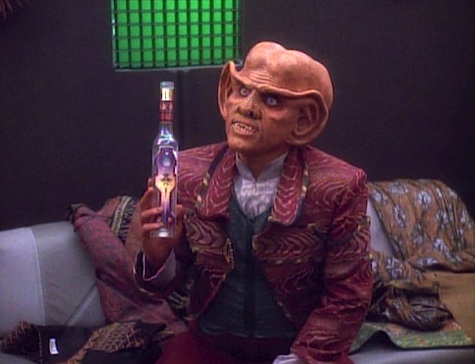
This is the first appearance of O’Brien and Bashir’s dart board, which will eventually become a fixture in Quark’s. After the racquetball court from “Rivals” proved too difficult to reconstruct, they needed a new game for the two of them to play that would allow conversation. Voyager already had a holodeck pool table, and TNG had done cards with Riker’s weekly poker game, so they settled on darts.
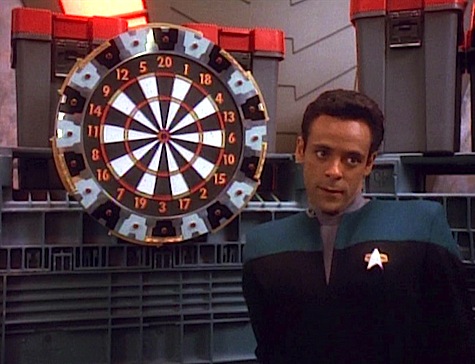
Another Carrington Award nominee, Chirurgeon Ghee P’Trell, appears in your humble rewatcher’s Articles of the Federation as the head of Starfleet Medical, and also appears in the Star Trek Online game. The award itself is also mentioned in the novels Crucible: Provenance of Shadows by David R. George III (which establishes that Dr. McCoy won the award once) and Unspoken Truth by Margaret Wander Bonanno, and in the Slings and Arrows eBook The Insolence of Office by William Leisner.
Tiny Ron gets to speak dialogue for the first time in this episode, but only when he plays one of the wormhole aliens using Maihar’du as an avatar. Ron will get dialogue in his two appearances on Voyager as an Alpha Hirogen in “Message in a Bottle” and “Hunters.”
Walk with the Prophets: “Your argument is specious.” For the most part this episode is a meringue: it’s fluffy, it’s harmless, it tastes good, but an hour after you eat it, you’re hungry again. It’s a good vehicle for Armin Shimerman and Max Grodénchik especially, who bounce off each other magnificently, and also for Tiny Ron, who gets a great deal out of Maihar’du’s confusion and sadness regarding Zek’s new philanthropic ways.
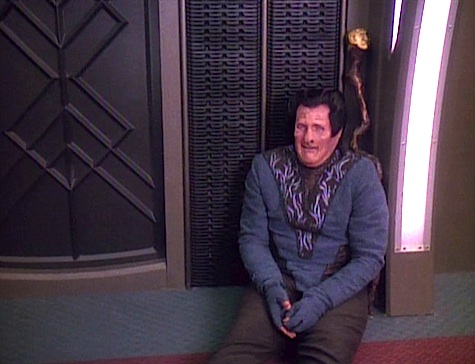
But the episode just comes across as so—so meaningless. It seems unlikely that Zek’s going to be able to reverse the entirety of Ferengi life just by forming a Benevolent Association. At first, people would defer to Zek out of respect, but the more charitable endeavors he undertakes, the more likely he is to be overthrown.
Quark saves the Ferengi Alliance from that, but that brings us to the next problem. Zek isn’t suffering a psychic break or a psychological breakdown or early onset Alzheimer’s, but rather he’s been mentally messed with by the wormhole aliens.
Think about this for a second. These aliens barely even know what corporeal life is. Their interactions with linear time prior to this have been sending out Orbs that can tie into someone’s own mind and past and future, but that’s a far cry from specifically rewiring a corporeal being’s entire identity. And it’s not at all clear what the aliens gain from this mental rape of a person (and that’s what we’re talking about here, because no matter how much of a comic relief figure Zek is, he was still psychologically raped), nor why they thought it was a good idea. The aliens will, in the future, do other things that are pretty ethically dodgy to say the least, but all those other things will, to some degree, fall into the purview of what is believed possible by them.
This? Not so much. And it proves both anti-climactic and really really creepy all at the same time.
The B-plot is barely worth mentioning. It’s cute watching Bashir try to be mature and accepting and not actually being allowed to by his friends who all want him to succeed, to the point where he really does give a damn about the award by the time he doesn’t get it at the end. But the story has no substance, no real meaning—it’s a diversion from the Ferengi that gives the rest of the cast something else to do. The only time it’s really interesting is when Quark throws Bashir’s likelihood of not winning the award in the doctor’s face when he gives Zek a clean bill of health.
Warp factor rating: 3
Keith R.A. DeCandido has actually written a piece of Ferengi-focused fiction, the “Ferenginar” portion of Worlds of Star Trek: Deep Space Nine Volume 3, published in 2005. It makes basically no reference whatsoever to this episode. Which is fine.










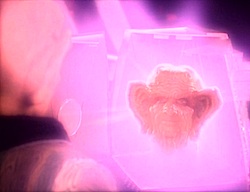
Not only is this episode meaningless, it’s also recyclingthe ending from “Clues” in TNG. For those who don’t want to read KRADs most excellent review of it, it got a 5 out of 10 and ended with the all powerful aliens pulling out the deus ex machina reset button ending. While this episode doesn’t perfectly reset (Quark still has a boatload of self sealing stembolts and no furniture or oo-mox) it basically resets Zek back to what he was, without any sort of explanation as to why the wormhole aliens felt it necessary to do this or for that matter how they did it in the first place. If they have the power to rewrite peoples minds, why didn’t they just erase Sisko’s mind in “Emissary” and kick him out of the wormhole?
The only thing I can think of worth mentioning in this entire episode is the fact that it is interesting that it establishes the Ferengi as not entirely a greedy people.
The Rules of Aquisition are fun and interesting put put the period on them being a pretty vile people and that’s kind of harsh. We really only get glimpses of their potential through Rom’s niceness, Nog’s willingness to be so un-Ferengi, and Quark occasionally showing his heart. But this establishes that the Ferengi were once a good people who didn’t value profit above all life and good-will and that they can be that again…or a hybrid. Other than that, yes, meaningless and slightly creepy in the mind-rape thing. At least when Enterprise did it (with the Rape-Meld) they took it seriously, it had weight, and it showed through in future episodes as a traumatic experience. Here it’s just “Ha Ha look what they did to the silly, wringly Zek!” and then he forgets about it later and Quark has no furniture.
It’s worth noting, though, that the subplot about Zek having an Orb to sell to the Bajorans — which was pretty much abandoned onscreen — was the basis for the plot of The 34th Rule, the DS9 novel that Armin Shimerman would later co-write in collaboration with David R. George III (who’s gone on to write quite a few other Trek novels since, including several more DS9 books), with plot assistance from Eric A. Stilwell. Although that’s a Quark-centric novel, it’s a lot more dark and dramatic than the show’s Ferengi episodes generally got.
I really need to catch up on my Star Trek novels, especially my DS9 novels. I just started the DS9 series and just finished Avatar Book 2 but I got jumbled and with my Next Gens I’m past the Destiny Trilogy and about to start Typhon Pact.
I like that Shimerman came back to revisit the character, much like Andrew Robinson did with his excellent A Stitch in Time, but that was written soley by Robinson.
Hmmm thought there might be another reason why Bashir wouldn’t want the publicity of winning….
This may well be the weakest of the Ferengi-centric episodes. As everyone has pointed out, there’s no substance at all. Frankly, the best thing about it is probably the return of the self-sealing stembolts. Second best is Odo’s gossip, which hearkens back very nicely to Ferris Bueller.
As I understand it, the B-plot was an in-joke. TNG had been up for some Emmy and, while they all knew they had no chance, they got rather caught up in the “what if”, rather like Bashir.
@5 adamjmil
Certainly in retcon, there’s another reason Bashir wouldn’t want to win, but that hadn’t been established by this point.
I would have hoped that, in the choice of darts, there was a little more thought given, other than mere simple elimination of various forms of static (for purposes of conversation) small team sports.
After both characters are generally accepted to have shared an origin in the wider the British Isles; the home of modern darts and the classic pub-darts combo!
Miles was from Killarney in what is now the Republic and whilst I don’t think Julian’s pre-Adigeon Prime birthplace was ever established onscreen, Ronald D Moore always thought of the character as British Arab or British Asian (in UK usage – south not east). Certainly they gave him British-sounding parents in ‘Dr Bashir I presume’ (with a delightful turn by Brian George using his adopted London accent).
@6: “This may well be the weakest of the Ferengi-centric episodes.”
Just wait until we get to “Profit and Lace.”
@8
I had repressed that so deeply, that I had to go look it up at Memory Alpha. And it still doesn’t really ring any bells. And it was voted the worst DS9 episode ever. Wow.
Ok, let’s just call this a really weak Ferengi-centric episod.
“Quark and Rom pour over the new Rules,”
I only point this out because this word’s misspelling always stands out to me, but it should be “Quark and Rom pore over the new Rules”.
I thought the closing line was awesome, though.. Quark “You embezzled? From the Grand Nagus? Father would be proud..”
Ditto to @10, it is indeed PORE in this context.
I didn’t mind this one so much. As for the reset button, though, I’ve often wondered if the wormhole aliens didn’t leave Zek still just a *teeny* bit changed, which accounts for his willingness to listen to Ishka later on…
yeah, from what i read in the DS9 companion, the writers of this episode used the B-plot with Bashir, as kind of a ribbing at the Emmys. The previous year, TNG had been nominated for best dramatic series, which everyone knew it wouldn’t win.
I really did not quite get the whole Bashir plot, honestly, everybody on the station kind of came off as a jerk towards him – nominating for some award he had no hope of winning, and then constantly rubbing it in his face??? Maybe that would have worked in the first season where he was a bit more annoying.
As for the rest of it…I was definitely a bit chilled at the reveal that they had just decided to change him for their own purposes/amusement. Like…what? That’s really pretty horrible. I was wondering if perhaps Zek had seen a future where their greed/avarice led them to a bad end, although I also knew that whatever changes were wrought in this episode would most likely be reversed anyway by the time the episode was over. Although perhaps it could have been interesting to explore the effect such changes would have and the gradual way they’d need to take place – but there’s already too much going on in the show anyway.
Also, what happened to that starving planet that was going to get a grain shipment???
The one thing that made me laugh a bit is when Zek says they have to go ‘beyond greed’. There’s an order of (dissident) nuns near where I live who often talk about going ‘beyond Jesus’ and to be honest, it makes me shake my head a bit. Not my preferred flavor of Catholicism, let’s just put it that way. So while I don’t really enjoy the particulars of the Ferengi worldview, I can empathize a little with their confusion/angst over the whole thing.
Wait, Odo has friends in Starfleet Intelligence?
@12 – tankgirl73: Yeah, I always thought Zek’s mind was opened to new thoughts, and that made him more receptive to Ishka’s way of thinking.
@14 – Lisamarie: “Dissident Nuns” is my #newbandname.
If this had been during S1, I bet Bashir would have been a lot more excited about the Carrington, and a lot more verbal about losing. I wonder why some of the Rules of Acquisition sound like human proverbs? How did Zek go into the wormhole without being stopped by DS9? The FBA led to the FCA. Juliana Donald also plays a Prophet, KRAD. Rene Auberjoinois seemed keen on redeeming Zek, first by introducing him to the Prophets, and then Ishka in Ferengi Love Songs. But I wonder if Maihardu was just as cut up about the new Zek at the end of the series just as he was here? I think the Prophets are just as clueless about corporeal beings as they were in Emissary, and that’s why they changed Zek for the hell of it.
@16/David Sim: “I wonder why some of the Rules of Acquisition sound like human proverbs?”
Well, Ferengi aren’t above taking things that aren’t theirs, after all. Or maybe it’s the Universal Translator selecting the equivalent proverb in English. And the same thing happens with Klingons, remember — “Today is a good day to die” (anecdotally attributed to Crazy Horse as his war cry) and “Revenge is a dish best served cold” (found in many Earth cultures and popularized by the novel Les liaisons dangereuses — though I’ve always felt Khan was joking when he called it a Klingon proverb, since when the hell would he have had the opportunity to learn much about Klingons?).
is this a meaningless episode? Because Zek’s policies later become more progressive over time going forward. Maybe Quark didn’t convince them to turn him all the way back, but that such a dramatic change is likely to be ineffective. They made only the changes that would lead to Ferengi progress.
just thought of that watching the apparently reviled profit and lace.
The only thing I will add to what has already been said is the voice of the actor playing Zek has the most obnoxious and annoying voice I have ever heard, with the possible exceptions of Gilbert Gottfried and Sarah Palin. I’d honestly rather listen to roosters all day.
@@@@@19 RMS81
Probably he means no *harm*. He’s really very short on *charm*… Enough of that.
I find it, frankly, *INCONCEIVABLE* that a person could be so annoyed by that voice.
Really nothing more to add to the review. Except for that it stroke me as a bit odd that the wormhole aliens said something like “we should change him too like we did with the other one before”. Wasn’t it established they don’t live in a linear time line? Even with Sisko’s explanation, they still don’t. How can there a “before” for them, then?
waka: You’ve put your finger on the pulse of why later portrayals of the Prophets are so problematic.
—Keith R.A. DeCandido
@@@@@19. RMS81: And that’s what makes him great! Actually the actor, Wallace Shawn, I believe spoke at a slightly higher pitch as Zek than normal. Weather that was by design or because of his Ferengi teeth, I don’t know. Personally, I’ve always been so entertained by his voice that I can’t say the thought ever crossed my mind of it being annoying. However, I can see where you are coming from.
@24/thierafhal: Making your voice higher or reedier is something you do in the back of the mouth and the throat, adjusting the shape of the air column, so the teeth would have nothing to do with it.
@25. CLB, [do you mind if I call you CLB? It’s much easier to type ;) ]
While that is largely true, there is a video on YouTube of Max Grodénchik (Rom, as I’m sure you know), where he talked about how his teeth affected how he had to say his lines. He demonstrated this and there was definitely a change in pitch from his normal voice.
You’re probably right and it’s highly likely that it was an acting choice by Wallace Shawn or the directors and not a mechanical one, but why discount the possibility of the latter.
@26/thierafhal: I sign my emails “CLB” most of the time, so it’s fine.
And Zek’s voice is different from Shawn’s in more ways than just pitch; it’s kind of a caricature of his own voice, the most irritating aspects of his voice turned up to 11 on purpose.
As for Grodenchik, the three Ferengi he played on TNG and DS9 all had rather different voices, and Rom’s voice evolved over time — initially it was sharper and more nasal like his previous characters, and eventually it softened and mellowed into something kind of like Bob Denver as Gilligan. So it’s not just a mechanical response to the false teeth, since all three characters would’ve had them. If there was a change in pitch as you describe, it may be that having false teeth requires you to enunciate more clearly and strongly to avoid slurring, and people often raise the pitch of their voices when they do that. Or maybe what you heard in the demonstration was just the difference between his natural voice and his “acting” voice.
Lockdown rewatch. I really should hate this episode, The plot is not worth discussing as nothing of consequence happens apart from them basically sending up the Series Premiere when Quark visits the Prophets.. But for some reason I find it not all that bad, mainly I think because I love Max Grodénchik as Rom and he gets some really funny moments in this episode. As for the B plot again nothing happens, Bashir spends all his time saying he isn’t going to win the award and at the end he doesn’t.. what was the point In that? Although I did enjoy Miles and Julian putting each other off whilst throwing darts.
4 out of 10… mostly for Rom.
@28/chad: “As for the B plot again nothing happens, Bashir spends all his time saying he isn’t going to win the award and at the end he doesn’t.. what was the point In that?”
Stories aren’t just about plot, they’re about character. It wasn’t about whether the award happened, it was about how Bashir’s reaction to the nomination revealed his character, and about exploring his relationships with the other characters through the ways they engaged with him over it. The award was just a MacGuffin — something that isn’t important to the audience but that catalyzes the characters’ actions because it’s important to them.